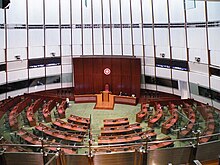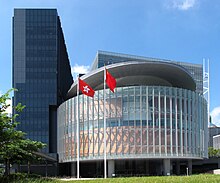
Back مجلس هونغ كونغ التشريعي Arabic Consell Legislatiu d'Hong Kong Catalan Legislativní rada Hongkongu Czech Legislativrat (Hongkong) German Νομοθετικό Συμβούλιο του Χονγκ Κονγκ Greek Consejo Legislativo de Hong Kong Spanish Hongkongi seadusandlik nõukogu Estonian شورای قانونگذاری هنگ کنگ Persian Hongkongin lainsäädäntöneuvosto Finnish Conseil législatif de Hong Kong French
Legislative Council of Hong Kong Special Administrative Region 香港特別行政區立法會 | |
|---|---|
| 7th Legislative Council | |
 | |
| Type | |
| Type | |
| History | |
| Founded |
|
| Preceded by | Provisional Legislative Council |
| Leadership | |
| Structure | |
| Seats | 90 |
 | |
Political groups |
|
| Elections | |
Last general election | 19 December 2021 |
Next general election | 2025 |
| Meeting place | |
 | |
| Legislative Council Complex, 1 Legislative Council Road, Tamar, Central & Western District, Hong Kong | |
| Website | |
| legco.gov.hk | |



 |
|
Politics and government of Hong Kong |
|
Related topics |
The Legislative Council of the Hong Kong Special Administrative Region, colloquially known as LegCo, is the unicameral legislature of Hong Kong. It sits under China's "one country, two systems" constitutional arrangement, and is the power centre of Hong Kong's hybrid representative democracy, though popular representation in the legislature has diminished significantly in recent years, along with its political diversity.[2][3]
The functions of the Legislative Council are to enact, amend or repeal laws; examine and approve budgets, taxation and public expenditure; and raise questions on the work of the government. In addition, the Legislative Council also has the power to endorse the appointment and removal of the judges of the Hong Kong Court of Final Appeal and the Chief Judge of the High Court, as well as the power to impeach the Chief Executive of Hong Kong.[4][5]
Following the 2019–2020 Hong Kong protests, the National People's Congress disqualified several opposition councillors and initiated an electoral overhaul in 2021. The current Legislative Council consists of three groups of constituencies—geographical constituencies (GCs), functional constituencies (FCs), and Election Committee constituencies—and has been dominated by the pro-Beijing camp since an opposition walkout in 2020.[6] The 2021 changes resulted in a drop in the share of directly elected representatives from 50% to 22% and an increase in the overall number of seats from 70 to 90, along with the establishment of a screening committee to vet candidates.[6]
The original two groups (GCs and FCs) had constitutional significance. Government bills requires a simple majority of the council for passage, whereas private member bills requires simple majorities in two discrete divisions of geographical members and functional members for passage. Therefore, the directly elected legislators (mainly from the GCs) had minimal influence over government policy and legislative agenda.[citation needed]
The historical Legislative Council of Hong Kong in the British colonial era was created under the 1843 Charter as an advisory council to the Governor. The authority of the colonial legislature expanded throughout its history.[5] A parallel Provisional Legislative Council was put in place by China from 1996 to 1998 to pass laws in anticipation of the Hong Kong handover.
- ^ "2021 Legislative Council General Election - Election Brief". Elections.gov.hk.
- ^ "Hong Kong downgraded from 'flawed democracy' to 'hybrid regime' as city drops 12 places in Economist's democracy index". Hong Kong Free Press HKFP. 3 February 2021. Retrieved 20 September 2021.
- ^ "Hong Kong electoral reform: LegCo passes 'patriots' law". BBC News. 27 May 2021. Retrieved 16 January 2023.
- ^ "LegCo Today". Legislative Council Commission.
- ^ a b Cite error: The named reference
Official Historywas invoked but never defined (see the help page). - ^ a b "Hong Kong electoral reform: LegCo passes 'patriots' law". BBC News. 27 May 2021.
... the Legislative Council (LegCo), which has been dominated by pro-Beijing lawmakers since a mass opposition walkout last year.... While overall seats will increase from 70 to 90, the number of directly elected representatives will fall from 35 to 20.
